immune & allergy support

free shipping over $100 (USA & Canada)
1-877-937-4372 the pet expert hotline
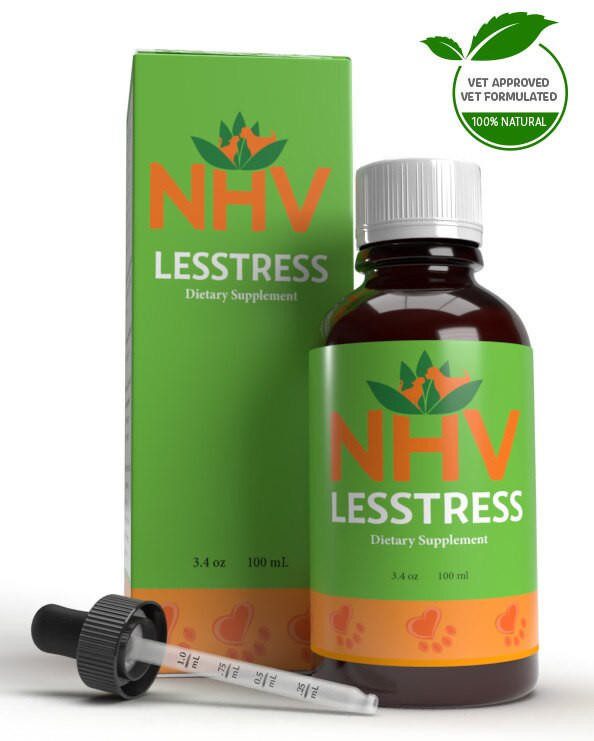
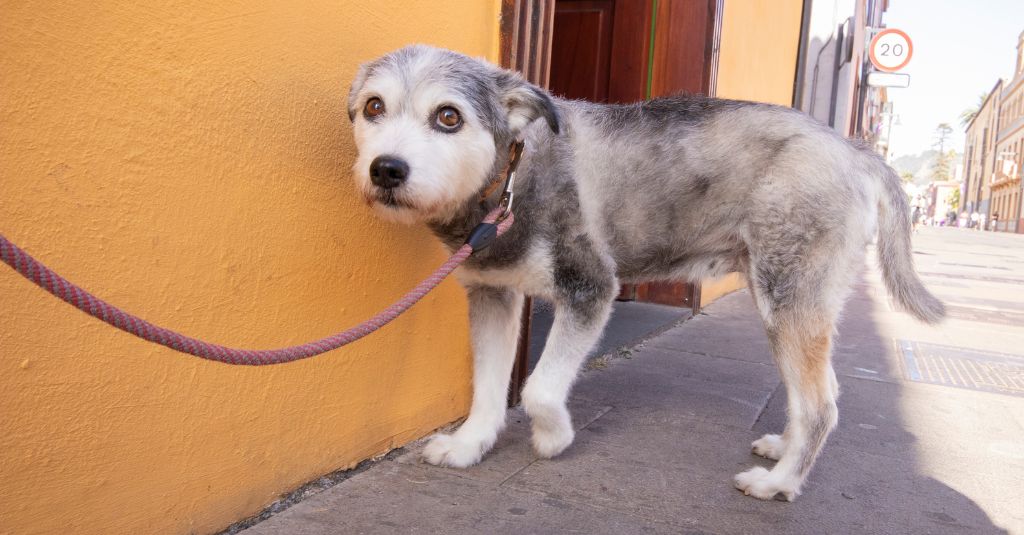
A shy dog shows typical tell-tale signs of discomfort and may require attention. Next time you receive a visitor in your home or take your pup to meet a new pet, pay attention to how your little one reacts. If they bark, put their tail between their legs, or hide, they feel insecure, and that stress may lead to severe health conditions in the future. Know what symptoms to look after and easy ways to help your little one gain confidence in new situations.
Just like humans, dogs have their temperament, which may vary according to different factors. One of the aspects that can affect your little one’s sociability levels is their breed. Akita Inus, Yorkshire terriers, Greyhounds, and Chihuahuas, for example, are known for being more timid, introverted, and anxious.
Excessive seclusion caused by stress can deteriorate your pup’s quality of life and health.
The presence of other animals in the same household and the age at which they became a family member can also interfere. Rescued dogs may have more shy and introspective behaviors, as sometimes they have had traumatic past experiences, which can trigger fear-response.
In that same sense, while some pups like to be near us and cuddle all day, a shy dog might be very independent and prefer some alone time. It shouldn’t be a concern if this is a normal response based on their personality. The problem is when their quality of life decreases due to excessive seclusion.
Most pets will react to changes, as new situations might be scary for them. However, if a dog shows extreme discomfort and the following symptoms regularly, you might want to visit a veterinarian or behavioral trainer:
If your vet rules out any health problems that might be causing these behaviors, most times, lack of stimulation is the cause behind a shy dog. Pets that live alone, do not walk or were separated early from the litter tend to demonstrate this trait more often. These are easy ways to help your shy dog gain confidence in those cases:
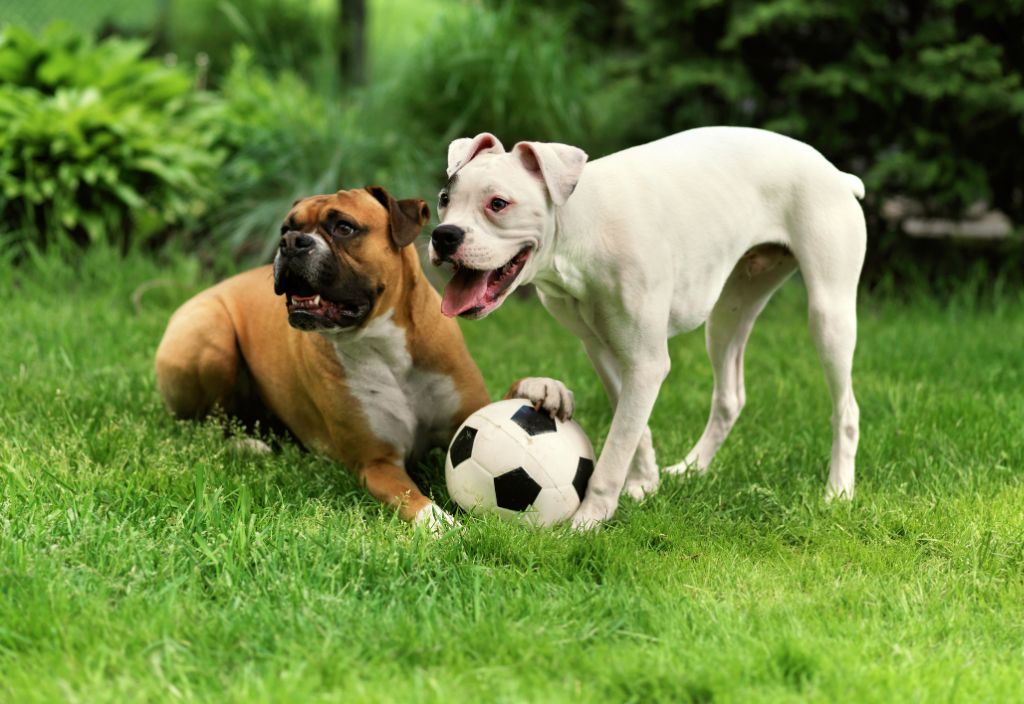
Play is a common characteristic of social animals, which includes humans and dogs. A shy dog adapts better to the environment when they can count on enriching activities that stimulate the senses and their innate instincts. However, we must read the dog’s body language to understand whether they are willing to play and stop when they show any sign of discomfort.
Experts recommend socializing dogs at a young age because they are more receptive to new situations. A puppy is more likely to face new things with curiosity than fear. But no matter your little one’s age, it’s crucial to always slowly and gradually introduce them to new people and pets. If your shy pup shows signs of fear or discomfort, it is time to stop. It is time to try another approach when they feel comfortable and confident again. Patience is key!
Reinforce positive behavior when your dog does something that shows improvement will go a long way. If your pet calmly lets another dog smell them or come near, encourage that with a praise or a treat. Anytime they seem comfortable and calm around new experiences, use a kind voice or offer their favorite snack to show they’re on the right track.
If you believe your little one needs some extra help calming aggression and easing agitation before being exposed to any of these new experiences, natural supplements could be the solution. Our supplements are gentle and might take some time to show their full benefits, so we recommend starting your little one on any of these formulas a couple of weeks prior to the stressful event.
NHV Lestress is a herbal formulation that acts on the nervous and immune systems, calming dogs naturally. It also helps to reduce hyperactivity and excitability and reduces destructive behavior.
NHV Stimmune helps balance the immune system and can be a considerable aid in proactive and active care, as stressful situations can sometimes trigger diseases.
The fragrance of herbs like Lavender, Chamomile, Lemongrass, and clove on our NHV Coco Furcare topical blend can help calm dogs. Just spray a few times on your puppy’s neck and let the pleasant scent do the trick. In addition, this topical spray is known for helping to keep the coat and skin healthy.
Socialization is crucial to help your little one develop into a happy and healthy pup! Patience and love are determinants, and we are always here to guide you through it all. If you have any questions about caring for your shy dog, feel free to reach out to our pet experts. Click the button below, and someone on our team will be happy to help.
immune & allergy support

Natural Dog Food Allergy Supplement and Immune Support.
buy 2 and save $3
3 month supply for a small to medium size
Soothes food allergies, skin allergies (dermatitis), and infection. Helps relieve a variety of symptoms related to allergies. Supports a healthy balance of the immune system in pets with conditions such as autoimmune disease.

Soothes food allergies, skin allergies (dermatitis), and infection. Helps relieve a variety of symptoms related to allergies. Supports a healthy balance of the immune system in pets with conditions such as autoimmune disease.
Stimmune helps balance the immune system and helps ease allergy symptoms that can make your dog miserable. Stimmune is an all-natural, vet-formulated dog allergy immune supplement that will help your pet deal with dog food allergies as well as other immune related disorders.
Stimmune can provide dog allergy help with allergic reactions related to food, as well as environmental allergies including reactions to fleas, insect bites, food and other environmental factors. For more acute seasonal or environmental allergies, please try Alge-Ex for a remedy specifically formulated for your dog.
An allergy is an overreaction of the immune system to a normally harmless substance called an antigen. Allergies in dogs often occur when allergens are inhaled, ingested, or absorbed by the body. When this occurs, the immune system becomes over-reactive to substances it believes are harmful. This reaction causes a release of histamine, causing the common allergy symptoms in your pet.
The cause of allergies in dogs can be difficult to determine. While it is always best to eliminate the cause altogether, like omitting a specific food from their diet, some causes can be nearly impossible to totally eradicate, like dust mites or pollen. This is where a dog allergy supplement that is taken daily can help relieve your loved one of common allergens, even when you're not exactly sure what they are allergic to.
Dog food allergy support is close at hand with Stimmune added into your pet’s daily regimen. This 100% natural herbal supplement was formulated by a holistic veterinarian to comprehensively care for your pet’s health.
Explore our Pet Expert Q&A to ask questions about your pet’s allergic reactions or view questions that other concerned pet owners like you have posted. Or, visit our blog to learn how to prevent food allergies in dogs and cats.
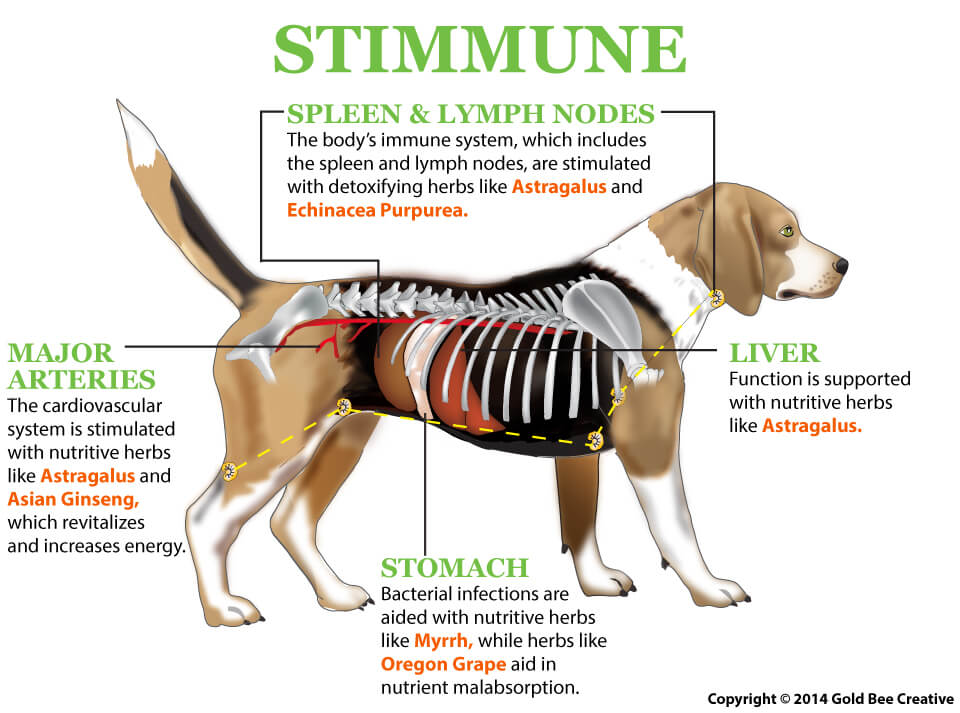
Astragalus – Stimulates liver function and helps balance the immune system. High in antioxidants it also helps protect against oxidative damage.
Echinacea Purpurea – Reduces inflammation, helps boost the immune system and efficiently fights infection.
Oregon Grape – Has antibiotic, anti-inflammatory and immunostimulatory properties.
Asian Ginseng – Has been used for thousands of years to help against various health issues. This antioxidant herb helps balance the immune system, helps the body fight infections and helps the body cope against stress.
Myrrh – An astringent that relieves irritated skin, Myrrh is high in anti-inflammatory and antioxidant effects.
Select your pet's weight to determine the correct dose.
To be taken twice daily. Determine your pet’s weight and then use the easy chart below to determine the correct dose. This is the minimum dosage.
Pet's Weight Dosage
0 - 15 lb = 0.5 ml
16 - 30 lb = 1.0 ml
31 - 45 lb = 1.5 ml
46 - 60 lb = 2.0 ml
61 - 75 lb = 2.5 ml
Over 75 lb = 3.0 ml
For small animals (rabbits, ferrets), avians and reptiles use 1 drop for every 2 lb of body weight.
How to Administer
Shake well before use. The easiest method is to use the dropper provide and places the drops into your pet’s food or favorite treat. You can also use the dropper and squirt directly into the pet’s mouth.
Some pets can be finicky, if this occurs consider hiding the drops in foods most pet’s love such as fish, chicken or yogurt or a favorite treat. If your pet only eats dry food then soak a few kibbles at feeding time.
For Best Results
Herbal dietary supplements are beneficial to the health and wellbeing of your pet and are safe for long-term use. Every pet responds to natural herbal supplements differently, therefore it is important to be consistent and administer the product daily. Supplements generally take two to four weeks to take effect, however this will vary from one animal to the next.
Product Storage
All NHV Natural Pet Products are pure herbal extracts and contain no artificial additives, preservatives or coloring. Shelf life after opening is 6 months and must be refrigerated after opening.
Cautions and Contraindications
Do not use Stimmune in pregnant or nursing animals. Speak to your vet before using our products. A second visit is recommended if your pet’s condition does not improve, or deteriorates after continued use of the supplements.
All information provided by NHV Natural Pet Products is for educational purposes only.
Stimmune helps balance the immune system and helps ease allergy symptoms that can make your dog miserable. Stimmune is an all-natural, vet-formulated dog allergy immune supplement that will help your pet deal with dog food allergies as well as other immune related disorders.
Stimmune can provide dog allergy help with allergic reactions related to food, as well as environmental allergies including reactions to fleas, insect bites, food and other environmental factors. For more acute seasonal or environmental allergies, please try Alge-Ex for a remedy specifically formulated for your dog.
An allergy is an overreaction of the immune system to a normally harmless substance called an antigen. Allergies in dogs often occur when allergens are inhaled, ingested, or absorbed by the body. When this occurs, the immune system becomes over-reactive to substances it believes are harmful. This reaction causes a release of histamine, causing the common allergy symptoms in your pet.
The cause of allergies in dogs can be difficult to determine. While it is always best to eliminate the cause altogether, like omitting a specific food from their diet, some causes can be nearly impossible to totally eradicate, like dust mites or pollen. This is where a dog allergy supplement that is taken daily can help relieve your loved one of common allergens, even when you're not exactly sure what they are allergic to.
Dog food allergy support is close at hand with Stimmune added into your pet’s daily regimen. This 100% natural herbal supplement was formulated by a holistic veterinarian to comprehensively care for your pet’s health.
Explore our Pet Expert Q&A to ask questions about your pet’s allergic reactions or view questions that other concerned pet owners like you have posted. Or, visit our blog to learn how to prevent food allergies in dogs and cats.

Astragalus – Stimulates liver function and helps balance the immune system. High in antioxidants it also helps protect against oxidative damage.
Echinacea Purpurea – Reduces inflammation, helps boost the immune system and efficiently fights infection.
Oregon Grape – Has antibiotic, anti-inflammatory and immunostimulatory properties.
Asian Ginseng – Has been used for thousands of years to help against various health issues. This antioxidant herb helps balance the immune system, helps the body fight infections and helps the body cope against stress.
Myrrh – An astringent that relieves irritated skin, Myrrh is high in anti-inflammatory and antioxidant effects.
Select your pet's weight to determine the correct dose.
To be taken twice daily. Determine your pet’s weight and then use the easy chart below to determine the correct dose. This is the minimum dosage.
Pet's Weight Dosage
0 - 15 lb = 0.5 ml
16 - 30 lb = 1.0 ml
31 - 45 lb = 1.5 ml
46 - 60 lb = 2.0 ml
61 - 75 lb = 2.5 ml
Over 75 lb = 3.0 ml
For small animals (rabbits, ferrets), avians and reptiles use 1 drop for every 2 lb of body weight.
How to Administer
Shake well before use. The easiest method is to use the dropper provide and places the drops into your pet’s food or favorite treat. You can also use the dropper and squirt directly into the pet’s mouth.
Some pets can be finicky, if this occurs consider hiding the drops in foods most pet’s love such as fish, chicken or yogurt or a favorite treat. If your pet only eats dry food then soak a few kibbles at feeding time.
For Best Results
Herbal dietary supplements are beneficial to the health and wellbeing of your pet and are safe for long-term use. Every pet responds to natural herbal supplements differently, therefore it is important to be consistent and administer the product daily. Supplements generally take two to four weeks to take effect, however this will vary from one animal to the next.
Product Storage
All NHV Natural Pet Products are pure herbal extracts and contain no artificial additives, preservatives or coloring. Shelf life after opening is 6 months and must be refrigerated after opening.
Cautions and Contraindications
Do not use Stimmune in pregnant or nursing animals. Speak to your vet before using our products. A second visit is recommended if your pet’s condition does not improve, or deteriorates after continued use of the supplements.
All information provided by NHV Natural Pet Products is for educational purposes only.
general wellbeing

Newly adopted pets are often quite stressed. They have spent time in the shelter, removed from their previous home or even from time roaming the streets. Though they are happy to have found a forever home, all of these changes can be quite stressful and can cause some undesirable behaviors. Matricalm is an all-natural supplement designed to reduce anxiety, stress and undesirable behaviors in pets.
Newly adopted pets can often use nutritional support. Whether they are malnourished from being stray, not eating because of stress in the shelter or just adjusting to their new home, Multi Essentials can help to fill nutritional voids. This all-natural herbal multivitamin that can help to support your pet's health throughout their life.
Stress and anxiety can cause gastrointestinal upset. Plantaeris can help to soothe and relieve spasms of the digestive tract which may cause diarrhea. It works quickly and gently to help promote normal bowel function.
bundle and save with pet expert kits
3 month supply for a small to medium size
Newly adopted pets are often quite stressed. They have spent time in the shelter, removed from their previous home or even from time roaming the streets. This can lead to undesirable behavior and decreased appetite as they adjust to their new home. This blend of supplements can help your new pet's transition into their forever home be as stress-free and seamless as possible.

Newly adopted pets are often quite stressed. They have spent time in the shelter, removed from their previous home or even from time roaming the streets. This can lead to undesirable behavior and decreased appetite as they adjust to their new home. This blend of supplements can help your new pet's transition into their forever home be as stress-free and seamless as possible.
MATRICALM
Chamomile – Contains sedative properties.
Passion Flower – An effective, non-addictive sedative.
Lemon Balm – An aromatic herb used for nervous disorders, excitability, and anxiety.
Valerian – Stops heart palpitations, relaxes spasms, relieves discomfort, and regulates the nervous system.
Hops – Eases tension and anxiety in pets.
MULTI ESSENTIALS
Alfalfa – Contains high protein levels (50%), vitamins, amino acids, minerals, sugars, and other nutrients.
Oat – Contains gluten, vitamins, and minerals (Ca, P, Mn, Cu, Zn, Fe).
Dandelion– A highly nutritious food that stimulates liver secretions, improves digestion, and stimulates the appetite.
Kelp – Rich in macrominerals (Ca, K, Mg) and trace minerals.
Parsley – Contains protein (up to 22%), vitamins (A, C, B1, B2, K), and minerals (Ca, K, Fe, Mg, P).
Marshmallow – Contains high levels of Ca.
Chickweed – A highly nutritious digestive tonic.
Stinging Nettle – Contains vitamins, minerals, and other nutrients.
PLANTAERIS
Barberry – Treats inflammation and infections of the urinary tract.
Mullein – Soothes and lubricates tissues.
Bayberry – Contains tannins, resins, and gums that control bacterial infection.
Myrrh – Relieves spasms, inflammation, and digestive discomfort.
Thyme – Improves digestion and relaxes spasms.
Chamomile – Relaxes the digestive system.
Chinese Peony – Reduces inflammation and relaxes spasms.
Ginger – Relieves discomfort and stimulates circulation.
Oregon Grape – Helps relieve indigestion and malabsorption.
To be taken twice daily. (Each supplement) Determine your pet’s weight and then use the easy chart below to determine the correct dose. This is the minimum dosage.
Pet's Weight Dosage
0 - 15 lb = 0.5 ml
16 - 30 lb = 1.0 ml
31 - 45 lb = 1.5 ml
46 - 60 lb = 2.0 ml
61 - 75 lb = 2.5 ml
Over 75 lb = 3.0 ml
For small animals (rabbits, ferrets), avians and reptiles use 1 drop for every 2 lb of body weight.
Long term use: Feed recommended dosage every other day (1 day on 1 day off). If used in large dosages or over a long period of time it may become irritating to the stomach lining. Some pets may require a larger dosage due to their metabolism. You can safely double the recommended dosage.
How to Administer: Shake well before use. The easiest method is to use the dropper provided and place the drops into your pet’s food or favorite treat. You can also use the dropper and squirt directly into the pet’s mouth. Some pets can be finicky, if this occurs consider hiding the drops in foods most pet’s love such as fish, chicken or yogurt or a favourite treat. If your pet only eats dry food then soak a few kibbles at feeding time.
For Best Results: Herbal dietary supplements are beneficial to the health and well-being of your pet and are safe for long-term use. Every pet responds to natural herbal supplements differently, therefore it is important to be consistent and administer the product daily. Supplements generally take two to four weeks to take effect, however this will vary from one animal to the next.
Product Storage: All NHV Natural Pet Products are pure herbal extracts and contain no artificial additives, preservatives or coloring. Shelf life after opening is 6 months and must be refrigerated after opening.
Cautions and Contraindications: Do not use Yucca in pregnant or nursing animals. Allowing breaks in feeding helps alleviate the possibility of a irritating effect on the digestive tract. Speak to your vet before using our products. A second visit is recommended if your pet’s condition does not improve, or deteriorates after continued use of the supplements. All information provided by NHV Natural Pet Products is for educational purposes only.
Select your pet's weight to determine the correct dose.
This kit can absolutely help. The supplements were chosen for their support for anxiety.
This kit can help to support anxiety, nutrition and GI troubles. They are all safe to give if your pet has other conditions. Seek veterinary advice if you suspect your pet is unwell
Even if pets are over-all healthy, their bodies can be affected by stress. This kit would be a great way to keep your pet stress free and healthy when brought in to a new home
We recommend using this kit until your new pet happily settles into your home, generally we would expect for about 3 months.
MATRICALM
Chamomile – Contains sedative properties.
Passion Flower – An effective, non-addictive sedative.
Lemon Balm – An aromatic herb used for nervous disorders, excitability, and anxiety.
Valerian – Stops heart palpitations, relaxes spasms, relieves discomfort, and regulates the nervous system.
Hops – Eases tension and anxiety in pets.
MULTI ESSENTIALS
Alfalfa – Contains high protein levels (50%), vitamins, amino acids, minerals, sugars, and other nutrients.
Oat – Contains gluten, vitamins, and minerals (Ca, P, Mn, Cu, Zn, Fe).
Dandelion– A highly nutritious food that stimulates liver secretions, improves digestion, and stimulates the appetite.
Kelp – Rich in macrominerals (Ca, K, Mg) and trace minerals.
Parsley – Contains protein (up to 22%), vitamins (A, C, B1, B2, K), and minerals (Ca, K, Fe, Mg, P).
Marshmallow – Contains high levels of Ca.
Chickweed – A highly nutritious digestive tonic.
Stinging Nettle – Contains vitamins, minerals, and other nutrients.
PLANTAERIS
Barberry – Treats inflammation and infections of the urinary tract.
Mullein – Soothes and lubricates tissues.
Bayberry – Contains tannins, resins, and gums that control bacterial infection.
Myrrh – Relieves spasms, inflammation, and digestive discomfort.
Thyme – Improves digestion and relaxes spasms.
Chamomile – Relaxes the digestive system.
Chinese Peony – Reduces inflammation and relaxes spasms.
Ginger – Relieves discomfort and stimulates circulation.
Oregon Grape – Helps relieve indigestion and malabsorption.
To be taken twice daily. (Each supplement) Determine your pet’s weight and then use the easy chart below to determine the correct dose. This is the minimum dosage.
Pet's Weight Dosage
0 - 15 lb = 0.5 ml
16 - 30 lb = 1.0 ml
31 - 45 lb = 1.5 ml
46 - 60 lb = 2.0 ml
61 - 75 lb = 2.5 ml
Over 75 lb = 3.0 ml
For small animals (rabbits, ferrets), avians and reptiles use 1 drop for every 2 lb of body weight.
Long term use: Feed recommended dosage every other day (1 day on 1 day off). If used in large dosages or over a long period of time it may become irritating to the stomach lining. Some pets may require a larger dosage due to their metabolism. You can safely double the recommended dosage.
How to Administer: Shake well before use. The easiest method is to use the dropper provided and place the drops into your pet’s food or favorite treat. You can also use the dropper and squirt directly into the pet’s mouth. Some pets can be finicky, if this occurs consider hiding the drops in foods most pet’s love such as fish, chicken or yogurt or a favourite treat. If your pet only eats dry food then soak a few kibbles at feeding time.
For Best Results: Herbal dietary supplements are beneficial to the health and well-being of your pet and are safe for long-term use. Every pet responds to natural herbal supplements differently, therefore it is important to be consistent and administer the product daily. Supplements generally take two to four weeks to take effect, however this will vary from one animal to the next.
Product Storage: All NHV Natural Pet Products are pure herbal extracts and contain no artificial additives, preservatives or coloring. Shelf life after opening is 6 months and must be refrigerated after opening.
Cautions and Contraindications: Do not use Yucca in pregnant or nursing animals. Allowing breaks in feeding helps alleviate the possibility of a irritating effect on the digestive tract. Speak to your vet before using our products. A second visit is recommended if your pet’s condition does not improve, or deteriorates after continued use of the supplements. All information provided by NHV Natural Pet Products is for educational purposes only.
Select your pet's weight to determine the correct dose.
This kit can absolutely help. The supplements were chosen for their support for anxiety.
This kit can help to support anxiety, nutrition and GI troubles. They are all safe to give if your pet has other conditions. Seek veterinary advice if you suspect your pet is unwell
Even if pets are over-all healthy, their bodies can be affected by stress. This kit would be a great way to keep your pet stress free and healthy when brought in to a new home
We recommend using this kit until your new pet happily settles into your home, generally we would expect for about 3 months.
skin and coat health

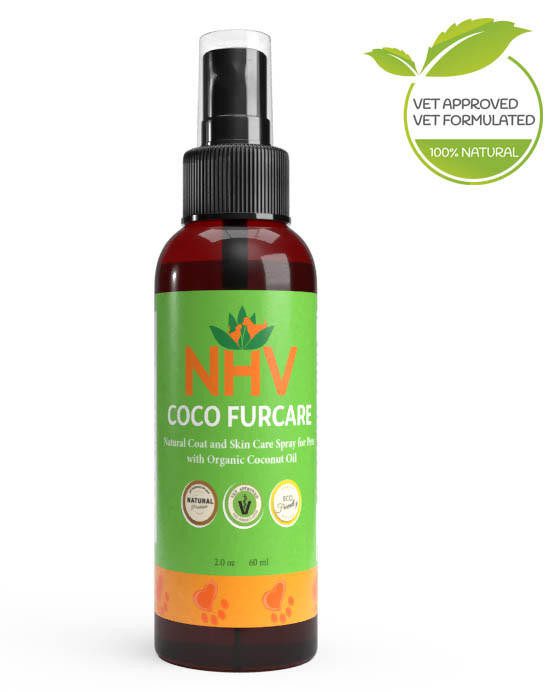
Holistic Dog Fur Care and Skin Supplement
This dog coat and skin supplement is an easy-to-apply topical spray. Coco Furcare for Dogs also helps deter external parasites, helps reduce itching and irritation from skin allergies, and keeps your dog’s coat sleek and healthy, all while keeping your pup smelling fresh and clean.


This dog coat and skin supplement is an easy-to-apply topical spray. Coco Furcare for Dogs also helps deter external parasites, helps reduce itching and irritation from skin allergies, and keeps your dog’s coat sleek and healthy, all while keeping your pup smelling fresh and clean.

Dog coat and skin supplements like Coco Furcare can help improve the shine and luster of your dog’s beautiful fur. Coco Furcare has natural ingredients that soothe the skin, deterring your pet from scratching themselves raw and leaving their skin open to infection. Protection against parasites and skin allergens also reduces itching and the possibility of future hot spots for your dog.
This spray-on supplement is formulated with powerful, all-natural ingredients like Neem leaf, sodium bicarbonate, and Eucalyptus. These ingredients have potent anti-inflammatory, antibacterial, and anti-pest properties that stop the source of any itching and soothe any irritation.
Coco Furcare is also made with ingredients like chamomile for a calming effect, moisturizers like cedarwood, and deodorizers such as lemongrass. All of these natural extracts help to provide comprehensive and effective care for your pet’s skin and coat.
Improper dog fur care and bites from pests like mites and fleas can result in a hot spot. Hot spots occur when a dog itches or obsessively grooms aggravated skin until the area is raw. The introduction of bacteria to the irritated area causes an itchy, infected sore. Hot spots can result in discomfort and induce hair loss. Left untreated, the wound can grow into a severe health concern.
NHV’s dog coat and skin supplements are formulated by veterinarians and herbalists with 20+ years of experience. Call our pet expert hotline and find solutions to your pet’s health concerns.
How to Apply
Lightly spray your pet from back of ears to tail, taking care to avoid the eye area. Brush through coat, repeat as needed.
For Best Results
Herbal dietary supplements are beneficial to the health and well-being of your pet and are safe for long-term use. Every pet responds to natural herbal supplements differently, therefore it is important to be consistent and administer the product daily.
Product Storage
All NHV Natural Pet Products are pure herbal extracts and contain no artificial additives, preservatives or coloring. Shelf life after opening is 2 years and refrigeration not required
Cautions and Contraindications
Avoid contact with eyes. In case of contact with eyes flush thoroughly with water. Keep out of reach of pets and children to avoid possible consumption. Do not use in pregnant or nursing animals. Speak to your vet before using our products. A second visit is recommended if your pet’s condition does not improve, or deteriorates after continued use of the supplements.
All information provided by NHV Natural Pet Products is for educational purposes only.
Dog coat and skin supplements like Coco Furcare can help improve the shine and luster of your dog’s beautiful fur. Coco Furcare has natural ingredients that soothe the skin, deterring your pet from scratching themselves raw and leaving their skin open to infection. Protection against parasites and skin allergens also reduces itching and the possibility of future hot spots for your dog.
This spray-on supplement is formulated with powerful, all-natural ingredients like Neem leaf, sodium bicarbonate, and Eucalyptus. These ingredients have potent anti-inflammatory, antibacterial, and anti-pest properties that stop the source of any itching and soothe any irritation.
Coco Furcare is also made with ingredients like chamomile for a calming effect, moisturizers like cedarwood, and deodorizers such as lemongrass. All of these natural extracts help to provide comprehensive and effective care for your pet’s skin and coat.
Improper dog fur care and bites from pests like mites and fleas can result in a hot spot. Hot spots occur when a dog itches or obsessively grooms aggravated skin until the area is raw. The introduction of bacteria to the irritated area causes an itchy, infected sore. Hot spots can result in discomfort and induce hair loss. Left untreated, the wound can grow into a severe health concern.
NHV’s dog coat and skin supplements are formulated by veterinarians and herbalists with 20+ years of experience. Call our pet expert hotline and find solutions to your pet’s health concerns.
How to Apply
Lightly spray your pet from back of ears to tail, taking care to avoid the eye area. Brush through coat, repeat as needed.
For Best Results
Herbal dietary supplements are beneficial to the health and well-being of your pet and are safe for long-term use. Every pet responds to natural herbal supplements differently, therefore it is important to be consistent and administer the product daily.
Product Storage
All NHV Natural Pet Products are pure herbal extracts and contain no artificial additives, preservatives or coloring. Shelf life after opening is 2 years and refrigeration not required
Cautions and Contraindications
Avoid contact with eyes. In case of contact with eyes flush thoroughly with water. Keep out of reach of pets and children to avoid possible consumption. Do not use in pregnant or nursing animals. Speak to your vet before using our products. A second visit is recommended if your pet’s condition does not improve, or deteriorates after continued use of the supplements.
All information provided by NHV Natural Pet Products is for educational purposes only.
Published: March 30, 2023